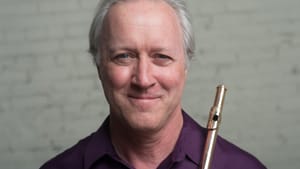Stay in the Loop
BSR publishes on a weekly schedule, with an email newsletter every Wednesday and Thursday morning. There’s no paywall, and subscribing is always free.
Fifteen strings and one lone flute
The Chamber Orchestra features Edward Schultz

The latest Chamber Orchestra of Philadelphia concert ended, unfortunately, with the two weakest items on the program: Phillip Glass’s 1983 string quartet arranged for string orchestra and Bernard Hermann’s Suite from Psycho. The Glass chugged along for four movements without much happening. The Hermann may have worked as movie music, but it doesn’t work as a stand-alone suite, unlike the suites Prokofiev and Shostakovich made from their movie scores.
I’m one of the six living Americans who have never seen Psycho, even though I’m one of the three living Americans who have read the article Robert Bloch wrote about the real crime his novel is based on. (I can handle written true crime, but I generally avoid horror movies.) If I had seen the movie, images from it might have crossed my mind and reinforced the music. On the other hand, I’ve never seen the Russian film Lieutenant Kìj̀̀e and I find Prokofiev’s Lieutenant Kij̀e Suite amusing and enjoyable.
Five winners
The rest of the concert presented five winners. The afternoon opened irresistibly with 15 strings playing a tune straight out of a nursery rhyme. Gustav Holst built his 1913 St. Paul’s Suite around melodies that sound like English folk tunes. The suite could have been shallow and cloying, but the composer constructed it with style and imagination. When Holst turned to real folk tunes in the last movement, for example, he used the most familiar tune on the library shelves, Greensleeves, as a counter melody to a traditional fiddle tune.
The orchestra gave the suite the kind of fast paced, resonant performance that proves recordings will never replace live concerts. The suite wouldn’t have sounded half as vital if all that full-bodied string music hadn’t been bouncing off the walls of a well-designed theater.
Energy and emotion
Conductor Dirk Brossé gave the wind players a vacation, devoting the program to 20th- and 21st-century works for string orchestra. Bela Bartok’s 1917 Rumanian Folk Dances presented seven examples of the energy and emotion we expect when a composer turns to the music of Central Europe. Max Richter’s 2004 On the Nature of Daylight is “a strict bit of Renaissance counterpoint,” according to the composer’s comments in the program notes, but he doesn’t want us to listen to it for the structure. He wants us to feel “transported.”
For me, Richter created a mysterious, slightly somber image of light traveling through the emptiness of interstellar space. That may not be the exact image the composer had in mind, judging by his title, but I don’t think he would object.
Holding his own
The only wind player on the program was the Chamber Orchestra’s own first flute, Edward Schultz, who took the solo role in two pieces: the flute concerto that British composer Malcolm Arnold wrote in 1954 and Ernest Bloch’s 1956 Suite Modale for Flute and Strings.
The Arnold includes a second movement built around a particularly beautiful melody and a fast final movement in which the flute whistles like a fife over big thumping strings. The Bloch is a beautiful piece by a composer who is probably best known for his works on Jewish themes, particularly his Schelomo: Rhapsodie Hebraique for Cello and Orchestra. The Suite Modale is brighter than the cello rhapsody, but it’s just as melodious.
Edward Schultz has been one of the mainstays of the Philadelphia music scene for almost 40 years. He’s been the principal flute of the Pennsylvania Ballet for most of that time and the principal flute of the Chamber Orchestra since 2003. He’s also the principal flute of Vox Ama Deus and the Philly Pops, and a familiar face at Network for New Music concerts.
Schultz’s performances are always right on. You come away from pieces like the Arnold and the Bloch feeling you’ve heard the composer, not a performer. Dirk Brossé deserves a round of applause for making Schultz the headliner at this concert, with the same kind of placement in posters and brochures that visiting artists receive.
What, When, Where
Chamber Orchestra of Philadelphia. Holst, St. Paul’s Suite. Richter, On the Nature of Daylight. Arnold, Flute Concerto No. 1. Bartok, Rumanian Folk Dances. Bloch, Suite Modale for Flute and Strings. Glass, Staring Quartet No. 2 arranged for string orchestra. Hermann, Suite from Psycho. Dirk Brossé, conductor. Edward Schultz, flute. February 28, 2016 at the Perelman Theater, Kimmel Center for the Performing Arts, Broad and Spruce Streets, Philadelphia. 215-545-5451 or chamberorchestra.org.
Sign up for our newsletter
All of the week's new articles, all in one place. Sign up for the free weekly BSR newsletters, and don't miss a conversation.

 Tom Purdom
Tom Purdom